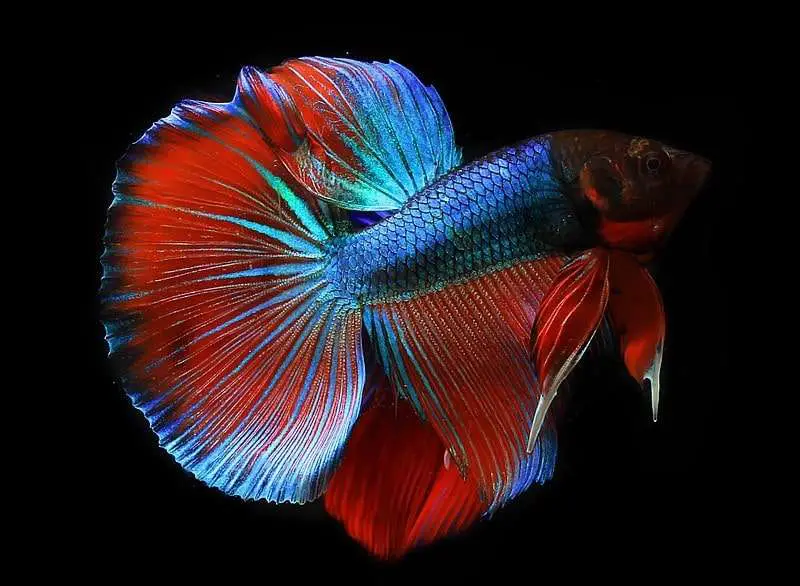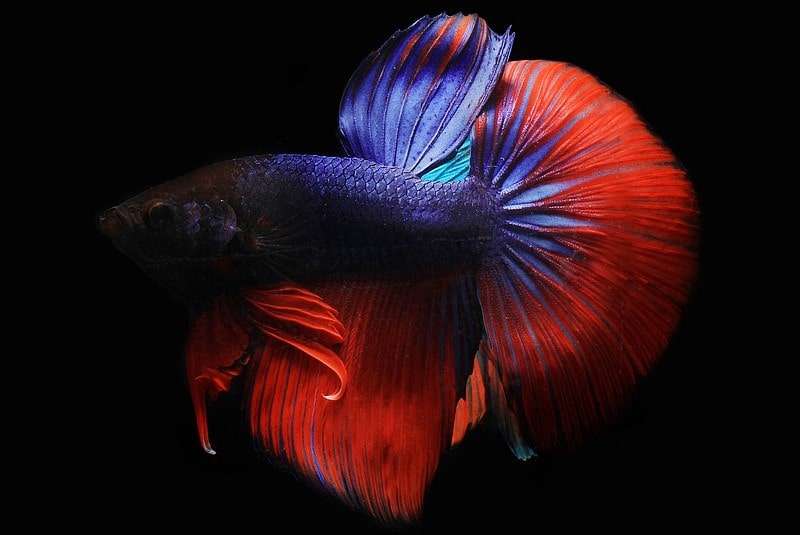
Curious about Betta fish are you? Good thing you found your way to this article because you are going to get every detail that you’d ever want to know about the Betta fish.
Learn where they come from, what they look like, their behavior, how much they cost, where to get yours, and so much more.
No time to waste lets jump right in!
What are Betta fish?
Betta Fish, also known as Siamese Fighting Fish, are freshwater fish native to shallow ponds, streams, rice paddles, and canals in Southeast Asia. Betta fish are known for their beautiful and bright red, lime green, and royal blue colors.
There are 73 different types of wild Betta fish that live in the freshwaters of Southeast Asia.
Betas are small, reaching between only 2 and 3 inches. In the wild, Bettas use their coloration to ward off potential predators and to attract mates. According to the University of Michigan’s Museum of Zoology, Wild Bettas do not possess the same beautiful red, lime green, and royal blues that you see in captive Bettas.
Wild Bettas have a more dull greyish-green color.
Betta fish are known for their aggressive behavior and that is one of the main reasons these fish are so popular among pet fish owners. Many pet fish owners are entertained by the behavior of their Betta fish.
Can two male Betta fish live together?
Two male Betta fish can not live together. Betta fish are known for their aggression and are very territorial fish.
Putting two male Betta fish together will almost certainly end in a fight to the death. If you want to have two males in the same tank, you need to get a divider for your aquarium.
Can two female Betta fish live together?
The territorial and aggressive behavior of Betta fish is mainly the characteristics of the male. While some females will be territorial, it is usually okay to put two female Bettas in the same tank, as long as the tank is big enough for the two. However, there is still potential for some fights to break out.
If you plan to put two females in the same tank together, consider at least a 10-gallon tank and add lots of tank accessories. Adding lots of accessories will give one of the females a place to hide if the other becomes aggressive.
Can a male and female Betta fish live together?
It is not a good idea to house a male and female Betta fish together. The only time a male and female should be together is when they are breeding. Even then, this should be done with supervision.
Betta fish were bred as fighters. The males represent this fighting attitude with lots of aggression and just don’t get along well with other Bettas, male or female.
What fish can live with a Betta fish?
There are lots of fish that can live with Betta fish. Most bottom feeders can since they stay near the bottom and Betta fish stay near the top. With bottom feeders, there shouldn’t be too much interaction between the two.
Aside from fish, they can get along with African Dwarf Frogs and Ghost Shrimp. These are two common non-fish tank buddies for Bettas.
Bettas do not get along with bigger, colorful fish because their colors and size set off the Betta’s fighting instinct. They also don’t do well with fish that like to nibble because the Betta fish will bite back.

Do Betta fish get lonely?
These fish are unlikely to get lonely. They are territorial fish and do better being alone.
While it is okay to put these fish with some other types of fish, Betta will be just fine alone. Just be sure to have a big enough tank so they don’t get bored easily.
How much do Betta fish cost?
The cheaper and more common can have a price range of about $5 to $25.
The rarer ones will cost you around $100.
Where can you purchase Betta fish?
You can purchase these fish at most pet shops in your area. You can even purchase them online.
How to ensure you buy a healthy Betta fish?
When buying a Betta, here are common signs to look for in an unhealthy or unkept fish:
- Pale Color (healthy fish are bright in color, especially males)
- Bulging Eyes (healthy fish have clear eyes)
- Scrapes or Scratches (check for injuries to their body)
- Unresponsiveness (if you move your hand along the tank and the fish doesn’t respond by moving, the fish may be injured or unwell and it isn’t worth the risk)
What kind of tank should you get for Betta fish?
A single Betta can live in a 5-gallon tank comfortably with a heater, but should never be put in a tank smaller than 2.5 gallons.
Putting your fish in a tank of fewer than 2.5 gallons is considered inhumane, so stick with a 2.5-gallon tank as the bare minimum. I recommend getting a 10-gallon tank.
What do you need for a complete tank setup?
Below is a list of a complete aquarium setup for your Betta:
- 10 Gallon Tank ($25-$30, 2.5-gallon minimum, 10-gallon recommended)
- 25 to 50 Watt Heater ($15-$20, You need a heater for your Betta)
- 10 Gallon Air Filter ($10-$15, Bettas can survive without an air pump, but need a filter to filter the air)
- 10 lbs Gravel ($5-$10, Used for decoration)
- Live Plants ($10-$15, Used for decoration and for other fish to hide from Betta, if you combine fish)
Assuming you use a table that you already have or go purchase a cheap one somewhere, you are looking at a price of around $100 to $150 for the total aquarium setup.
What do Betta fish like to play with?
Below is a list of common tank toys and accessories:
- Laser Pointer or Lights (Lights and laser pointers seem to stimulate these fish and get their attention)
- Marimo Moss Ball (A good thing for your fish to nibble on and the ball helps reduce algae growth and water toxins in the tank)
- Ceramic Log (A place for your fish to hide and to get exercise by swimming through the holes of the log)
- Leaf Hammock (For your fish to relax on close to the surface, which should feel natural for the Betta since this fish likes to be near the surface)
- Floating Log (Another toy that keeps the fish active)
- Mirror (If you get a small mirror for your fish, it will flare at the mirror, presumably because it thinks there is another Betta present)
Most of this stuff can be found on Amazon for under $10.

How long do Betta fish live?
These fish can live between 3 to 5 years in captivity with the proper care and about 2 years in their natural habitat. Wild Bettas have a very different environment than captive ones.
It isn’t uncommon for wild Bettas to spend a large part of their life moving from one water source to another.
Since these wild fish live in shallow water, they have to deal with dry seasons that cause their freshwater sources to dry up quickly, causing them to constantly be on the go.
Here are some tips to increase the lifespan of your fish:
- Get the right tank size for your fish (5-10 gallon tank)
- Install a filter in your tank for maximum oxygen quality
- Do full water changes monthly and swap out at least 20-25% of the existing water weekly
- Test your water’s pH, nitrates, and nitrites to ensure your fish has quality water
- If you are keeping the Betta with other fish, go with a minimum 10-gallon tank
It is important to note that if you get your Betta from a pet store, your fish will already be around 6 months to a year old. This is the typical age that pet stores start selling these fish.
How long can Betta fish live without food?
They can live approximately 14 days without food. Due to the dry seasons mentioned above, Bettas have naturally adapted to be able to go long periods without food since their main objective during the dry season is to find a new water source.
Food sources are very limited during the dry season since everything is drying up and limiting mobility.
While they can go about 14 days without food, it doesn’t mean that they are thriving or even healthy during their food drought.
You should never let your pet Betta go for more than a week without food because it will have used up all its internal resources and will go into starvation mode around that time.
If you have or are thinking about getting a pet Betta or any other fish, please follow the specific nutritional guidelines for that fish to ensure it stays in good health.
What temperature can Betta fish live in?
Betta fish can live in temperatures between 72-82 degrees. You should get a heater for your fish to keep the temperature comfortable and steady.
What do Betta fish eat?
Bella fish can eat the following:
- Variety of flakes
- Variety of pellets
- Freeze-dried bloodworms
- Frozen food
Feeding your Betta everything listed will give it a balanced and nutritional diet.
How do you care for a Betta fish?
Tips to help care for your fish:
- Get a suitable tank size
- Get a heater for your tank
- Get a mirror for activity
- Get toys for activity (log, lights, leaf hammock)
- Get plants to cut down on algae growth and water toxins
- Ensure your fish has a balanced diet (flakes, pellets, freeze-dried and frozen food)
- Check the water temperature and water toxin levels often
- Swap out 25% of the water weekly and all water in the tank monthly
Final Thoughts
Betta fish can be wonderful fish to have as pets. They are very colorful, active, and entertaining, which is why they are such popular pet fish.
As mentioned, this fish does not get along with other Bettas and should be kept as a solitary fish or with other fish that do not clash with the Betta.
This article should have provided you with all the necessary information on what a Betta fish is, the proper care for your Betta, the proper tank setup for your fish, and a lot more general information on the Betta.
I hope you found this article informative and useful and look forward to helping you out with your next pet question.
You can check out more information on other types of pet fish by clicking here.
